Martin Tansey Memorial Lectures
The ACJRD marks the contribution Martin Tansey made to Criminal Justice in Ireland and to this association with a Memorial lecture each spring. Information and papers from the lectures which have taken place since the inaugural event in 2008 can be found below.
Remembering Martin
Martin grew up in County Roscommon and began his career as a teacher before joining the Probation and Welfare Service in 1965 where he served until his retirement in 2002 working tirelessly to bring Government support and public recognition to the work of the Probation Service.
During his long and distinguished Civil Service Career, he guided the development of the organisation to the nationwide service we have today. The work of service requires patience, humanity, courage, an understanding that there are competing human rights and the capacity to balance those rights. Martin had these qualities in abundance combined with a considerable helping of common sense.
Martin was a persistent advocate of community sanctions, where the justice system worked with the offender to give him/her a second chance. He believed that the rehabilitation of offenders was a supremely rational social objective. That was his life’s work. Martin had a keen interest in promoting independent criminal justice research. He was a founder member and ultimately chairperson of the Irish Association for the Study of Delinquency (now ACJRD).
His judgement and discretion are legendary and he was well respected by his former colleagues in the justice and law enforcement community. Typical of the man, Martin remained quiet about his achievements and worked tirelessly for his country and his local community.
Martin died in March 2007 after a long illness, bravely borne.
Excerpts from ACJRD Martin Tansey Lectures since May 2008
Martin Tansey Memorial Lecture 2025 - Strategy to tackle domestic, sexual and gender based violence in Ireland
ACJRD is grateful to Dr. Stephanie O'Keeffe, CEO of Cuan, who presented the 18th Annual Martin Tansey Memorial Lecture, “Strategy to tackle domestic, sexual and gender based violence in Ireland” in the Criminal Courts of Justice on Thursday, 1 May 2025.
Drawing on her experience of national strategy development and implementation, Dr. O’Keeffe discussed national strategies over the last 15 years to address Domestic, Sexual and Gender-Based Violence in Ireland, with a particular focus on Zero Tolerance, the current, third national strategy. This talk drew out the main domains of activity to prevent domestic and sexual violence, to protect victims and survivors and to ensure effective pathways to and through justice. Dr. O’Keeffe explored the complex issues at hand, the importance of partnership and critical success factors for implementation and impact.
Dr Stephanie O’Keeffe’s powerful lecture was a fitting tribute to the public service principles espoused by Martin Tansey and we wish to thank her for her reflections on the progress on strategies to tackle domestic, sexual and gender based violence in Ireland. Dr O’Keeffe’s paper can be downloaded below.
Biography
Dr. Stephanie O’Keeffe was appointed as the first CEO of Cuan in February 2024.
Cuan is a new Statutory Agency, established under the Domestic, Sexual and Gender-Based Violence Agency Act 2023. Cuan is an Agency under the aegis of the Department of Justice.
Dr O’Keeffe previously worked in the Health Service Executive (HSE) as the National Director of Health and Wellbeing and more recently National Director of Operations Planning. She has over 20 years’ experience of working in the Irish public service, across a number of organisations and, was responsible for delivering Ireland’s first ‘whole-of-government’ population health strategy - Healthy Ireland, while working in the Department of Health.
In addition to a range of academic qualifications and professional development achievements, Dr O’Keeffe holds a PhD and MSc in psychology and has Diploma and Certificate qualifications from the Institute of Directors Ireland.
Martin Tansey Memorial Lecture 2024 - Women and the Criminal Justice System: Gender Matters
ACJRD is grateful to Maggie O’Neill, Professor in Sociology & Criminology, University College Cork, who presented the 17th Annual Martin Tansey Memorial Lecture, “Women and the Criminal Justice System: Gender Matters” in the Criminal Courts of Justice on Thursday, 2 May 2024.
The lecture drew upon a long history of research with women who come into conflict with the law, who engage with the criminal justice system as victims or offenders. In keeping with Martin Tansey’s life’s work and the values he promoted that underpin independent criminal justice research, the lecture highlighted the usefulness of interdisciplinarity and creative methods for centring the narratives of the actors involved and developing pathways to better knowledge and understanding, education and reintegration.
Biography
Maggie O’Neill is Professor in Sociology & Criminology at University College Cork and Director of ISS21, Institute for Social Science in the 21st Century and UCC Futures: Collective Social Futures. She is an elected member of the Royal Irish Academy in 2023. Before joining UCC she was Chair in Sociology & Criminology in the Department of Sociology at the University of York, and Professor in Criminology at the University of Durham and Principal of Ustinov College. She describes herself as an inter-disciplinary scholar.
Maggie’s PhD in Sociology explored the transformative possibilities for conducting feminist participatory action research with sex workers and was awarded in 1996. The majority of the empirical research she has conducted uses participatory action research, ethnographic and biographical methods and participatory arts. She has a long history of working with artists and community groups to conduct arts based research-working together to create change; social justice is at the core of her work. Further information on Maggie O’Neill can be found here.
Martin Tansey Memorial Lecture 2023 - Judicial Discretion and the Justice and Welfare Dichotomy: The Sentencing of Children in the Irish Youth Justice System
ACJRD is grateful to Dr John O’Connor, Judge of the Circuit Court, who presented the 16th Annual Martin Tansey Memorial Lecture, “Judicial Discretion and the Justice and Welfare Dichotomy: The Sentencing of Children in the Irish Youth Justice System” in the Criminal Courts of Justice on 20th April, 2023. Dr John O’Connor is a Judge of the Circuit Court and an Honorary Professor of Law at Nottingham Trent University.
Drawing on his experience as a judge in the Children Court in Dublin for nearly six years, he outlined some of his findings in his doctrinal research on judicial decisions on childhood offending, with particular emphasis on sexual offences in the context of the justice and welfare debate in Ireland. His research is the first study in Ireland to explore the complex terrain of juvenile sexual offending and judicial sentencing in the Irish youth justice system on sexual offending.
Biography
Dr O’Connor is a judge of the Circuit Court since February 2019. Prior to becoming a Circuit Court Judge, he was a judge of the District Court from 2012, where for nearly six years he was the principal judge in the Children Court in Smithfield.
Dr O’Connor is an Honorary Professor of Law with Nottingham Trent University [NTU] and holds a professional doctorate. He is also a qualified solicitor with the Law Society of Ireland and holder of several degrees, including LLB from University of Galway, LLM from University College Dublin and M.Litt. from Trinity College Dublin.
A frequent lecturer to academic and professional bodies, Dr O’Connor has a particular interest in capacity, mental health and neurodiversity law and practice.
Martin Tansey Memorial Lecture 2022 - Balancing the need for Due Process, Fair Trials and Systemic Efficacy: The Benefits & Challenges of Technological Improvements and Greater Efficiencies for the Criminal Justice System
The 15th Annual Martin Tansey Memorial Lecture was delivered Bruno Min, Legal Director (UK & International), Fair Trials. The lecture entitled "Balancing the need for Due Process, Fair Trials and Systemic Efficacy: The Benefits & Challenges of Technological Improvements and Greater Efficiencies for the Criminal Justice System" took place online on Thursday, 14th April, 2022.
Fair Trials:
Fair Trials is the global criminal justice watchdog, campaigning for fairness, equality and justice. Its team of independent experts exposes threats to justice through original research and identifies practical changes to fix them. Fair Trials campaigns to change policies, support strategic litigation, reform policy and develop international standards and best practice. This is done by supporting local movements for reform and building partnerships with lawyers, activists, academics and other NGOs.
Fair Trial’s mission is global but it is currently focused on campaigning for fair, equal and just criminal legal systems in Europe, Latin America, the UK and the US. It is the only international NGO that campaigns exclusively for the right to a fair trial, which gives it a comparative perspective on the causes of injustice and how to tackle them.
Fair Trials works with many partners and networks, to support and build wider movements for reform. These partners include local and international NGOs, lawyers and other criminal justice professionals, and academics.
Fair Trials is an independent, non-profit organisation with no party-political affiliations. It is funded by a combination of charitable grants and donations. Fair Trials is governed by a board of volunteer Trustees, responsible for the charity’s strategic direction and financial management.
For further information, please see www.fairtrials.org.
Martin Tansey Memorial Lecture 2021 - Probation and Mental Health: Do We Really Need 'Equivalent' Care?
Charlie Brooker, Honorary Professor, Centre for Sociology and Criminology, Royal Holloway, University of London, presented the 14th Annual Martin Tansey Memorial Lecture, "Probation and Mental Health: Do We Really Need 'Equivalent' Care?” online on Monday 24th May, 2021.
Download Prof Brooker's Lecture Paper
Summary: A ‘Zeitgeist’ is defined as ‘the defining spirit or mood of a particular period of history as shown by the ideas and beliefs of the time’, and I am pleased to say I think this is what is currently happening with probation and mental health. For too long, mental health has been the poor relation in probation practice — a situation that seems to be gradually changing. This paper draws from a series of research studies, undertaken locally, nationally and across Europe, to show that we are beginning to understand more and more about probation and the mental health of its clientèle. There are still serious gaps in our research knowledge, for example, about effective interventions, but the last decade has clarified the direction of travel that is required. The paper questions whether clients with mental health problems in probation require ‘equivalence’. That is, the same services that other members of the general population can access, who live in the community. I argue that the complexity of clients’ presentations does not equate to what is currently available in the community. Thus, new thinking is required, and much more research is needed to examine, for example, the role of assertive-outreach principles and models of service provision — perhaps alongside a sub-group of specialist Probation Staff specifically trained in mental health. There is a long way to travel before we can say that all Probation clients are receiving the mental health services they need.
Keywords: Mental health, probation, prevalence studies, systematic review, personality disorder, suicide, assertive outreach
Download Prof Brooker's Lecture Slides
The following links were shared by members of the audience during the Q&A session that followed the lecture
SPACE - Council of Europe Annual Penal Statistics https://www.coe.int/en/web/prison/space
Suicide and probation: A systematic review of the literature: https://www.cep-probation.org/wp-content/uploads/2020/10/Suicide-and-probation-A-systematic-review-of-the-literature-Sirdifield-Brooker-Marples.pdf
https://www.cep-probation.org/knowledgebases/mental-health-research/
Carmha Ireland, 81 Silver St, Nenagh South, Co. Tipperary, (Ph. 087 772 2671) is a charity which offers free counselling and peer-support service in a safe, non-judgmental environment for people over 18 years of age who have co-existing addiction and mental health issues.
Martin Tansey Memorial Lecture 2020 - Reducing Reoffending: Choices and Challenges
 The 13th Annual Martin Tansey Memorial Lecture, entitled "Reducing Reoffending: Choices and Challenges" was delivered online by Professor Ian O'Donnell, Professor of Criminology, University College Dublin Sutherland School of Law, on Monday, 29th June, 2020.
The 13th Annual Martin Tansey Memorial Lecture, entitled "Reducing Reoffending: Choices and Challenges" was delivered online by Professor Ian O'Donnell, Professor of Criminology, University College Dublin Sutherland School of Law, on Monday, 29th June, 2020.
This event was facilitated and hosted by UCD's Zoom facility.
Martin Tansey Memorial Lecture 2019 - Criminal Justice Culture(s) in Ireland: Quo Vadis?
The 12th Annual Martin Tansey Memorial Lecture was delivered by Professor Claire Hamilton, NUI Maynooth. The lecture entitled "Criminal Justice Culture(s) in Ireland: Quo Vadis?" took place in the Criminal Courts of Justice on Wednesday, 6th March, 2019.
Martin Tansey Memorial Lecture 2018 - A more humane approach to addressing the harm of criminal behaviour starts with victims
ACJRD is grateful to Tim Chapman for presenting the 11th Annual Martin Tansey Memorial Lecture, which was held on Tuesday, 17th April, 2018, in the Juror Reception Area of the Criminal Courts of Justice.
Tim Chapman is the current Chair of the Board of the European Forum for Restorative Justice (EFRJ) and a leading international expert on restorative justice issues. The EFRJ, established in 1998, is the leading organisation promoting the development of effective RJ policies, services and legislation in Europe. It aims to help establish and develop victim offender mediation and other restorative justice practices in the belief that every person in Europe should have the right of access to restorative justice services.
Tim Chapman has published widely on restorative justice and effective practice and has conducted significant research into restorative justice in Northern Ireland. Presentations and publications are available at
• http://ulster.academia.edu/TimChapman
• https://vimeo.com/247987821
• https://www.youtube.com/watch?v=n1ihRxPClYg
Tim Chapman is a visiting lecturer at the University of Ulster in Northern Ireland teaching on the Masters programme in Restorative Practices. He has contributed to the development of restorative conferencing in both the voluntary and statutory sectors in Northern Ireland. He spent over 25 years working in the Probation Board for Northern Ireland (PBNI), playing an active part in developing “evidence-based practice” both with adults and young people.
Martin Tansey Memorial Lecture 2017 - Desistance as a Social Movement
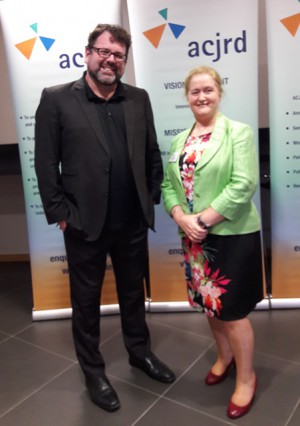 Professor Shadd Maruna, Professor of Criminology in the School of Law, University of Manchester, delivered this year’s Martin Tansey Memorial Lecture, entitled “Desistance as a Social Movement”.
Professor Shadd Maruna, Professor of Criminology in the School of Law, University of Manchester, delivered this year’s Martin Tansey Memorial Lecture, entitled “Desistance as a Social Movement”.
This lecture took place on Monday, 27th March, 2017, in the Juror Reception Area at the Courts of Criminal Justice.
Professor Maruna was previously Dean of the School of Criminal Justice at Rutgers University-Newark (2014-2016), He has worked at Queen’s University Belfast, the University of Cambridge, and the University at Albany, SUNY. His book, “Making Good: How Ex-Convicts Reform and Rebuild Their Lives’” was awarded the Hindelang Prize for “outstanding contribution to criminology” in 2001.
More recently, Professor Maruna has received the Hans Mattick Award for Distinguished Contribution to Criminology in 2014, and the inaugural Research Medal from the Howard League for Penal Reform in 2012. He has been a Soros Justice Fellow, a Fulbright Scholar and an H. F. Guggenheim Fellow. He is also the editor of the book series “Psychology, Crime and Justice” for American Psychological Association Books, and co-edited the book “Fifty Key Thinkers in Criminology” with Keith Hayward and Jayne Mooney (2010).
Pictured: Professor Shadd Maruna and Maura Butler, ACJRD Chairperson
Martin Tansey Memorial Lecture 2016 - The Reintegration of Sexual Offenders
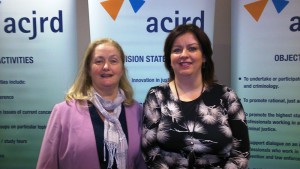 Prof. Anne-Marie McAlinden delivered the 9th Annual Martin Tansey Memorial Lecture entitled "The Reintegration of Sexual Offenders". The event took place on Thursday, 7th April, 2016, at the Criminal Courts of Justice, Parkgate Street, Dublin 8.
Prof. Anne-Marie McAlinden delivered the 9th Annual Martin Tansey Memorial Lecture entitled "The Reintegration of Sexual Offenders". The event took place on Thursday, 7th April, 2016, at the Criminal Courts of Justice, Parkgate Street, Dublin 8.
Pictured: Maura Butler, Chairperson, ACJRD, and Prof. Anne-Marie McAlinden
Martin Tansey Memorial Lecture 2015 - Building Trust and Confidence - Challenges and Opportunities for An Garda Siochana
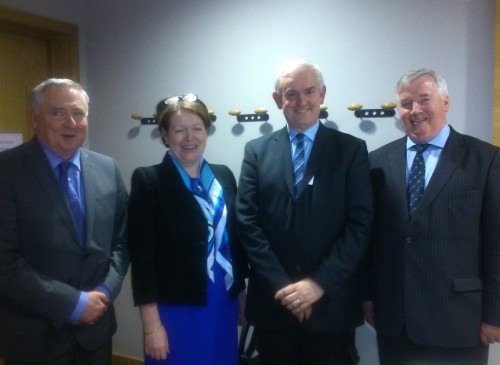 Noel Waters, Acting Secretary General, Department of Justice and Equality, Garda Commissioner Noirin O'Sullivan, Finbarr O'Leary, ACJRD, and Eugene Corcoran, ACJRD.
Noel Waters, Acting Secretary General, Department of Justice and Equality, Garda Commissioner Noirin O'Sullivan, Finbarr O'Leary, ACJRD, and Eugene Corcoran, ACJRD.
The 8th Annual Martin Tansey Memorial Lecture entitled "Building Trust and Confidence - Challenges and Opportunities for An Garda Siochana" was given by Garda Commissioner Noirin O'Sullivan. The event took place on Wednesday 1st April at the Criminal Courts of Justice, Parkgate Street, Dublin.
Martin Tansey Memorial Lecture 2014 - Integrated Offender Management: pooling resources and expertise and creating effective working partnerships
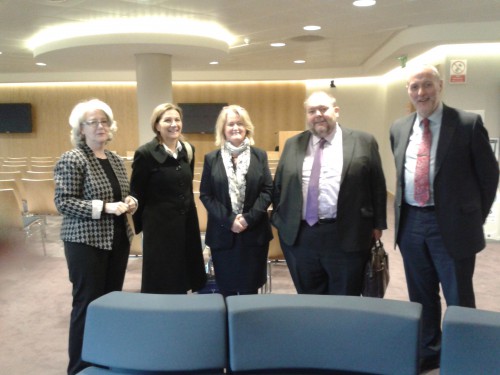 Her Hon. Judge Mary Ellen Ring, Her Hon. Judge Rosemary Horgan, President of the District Court, Maura Butler (ACJRD Chairperson), Professor Paul Senior and Vivian Geiran (Probation Service Director)
Her Hon. Judge Mary Ellen Ring, Her Hon. Judge Rosemary Horgan, President of the District Court, Maura Butler (ACJRD Chairperson), Professor Paul Senior and Vivian Geiran (Probation Service Director)
The 7th Annual Martin Tansey Memorial Lecture took place on Tuesday 29th April in the Criminal Courts of Justice, Parkgate Street, Dublin.
Prof Paul Senior, Director of the Hallam Centre for Community Justice at Sheffield Hallam University, delivered the lecture entitled Integrated Offender Management: pooling resources and expertise and creating effective working partnerships to an audience of professionals from the main Criminal Justice agencies, the Judiciary and Community groups.
Integrated Offender Management (IOM) evolved from a series of related practice experiments in England and Wales which brought together key partners – police, prison, probation, community safety partnerships and the voluntary sector – to find a more focused way to tackle persistent and prolific adult offenders. IOM survived a change of government and has continued to prosper though the jury is still out about how effective the model is at reducing re-offending. This talk will look briefly at the history of this initiative, drawing out and interrogating key elements in the operational and strategic structures, the extent of community involvement, consider issues of cost-effectiveness and the setting of a researchable agenda, and set this in the context of the co-production of services in both adult criminal justice service users and young people in transition to adulthood.
Martin Tansey Memorial Lecture 2013 - Throw Away the Key: Public and Judicial Approaches to Sentencing - Towards Reconciliation
The Hon Mr Justice Charleton delivered the lecture "Throw Away the Key: Public and Judicial Approaches to Sentencing - Towards Reconciliation" on 10th April in the Criminal Courts of Justice, Parkgate Street, to a large and enthusiastic audience.
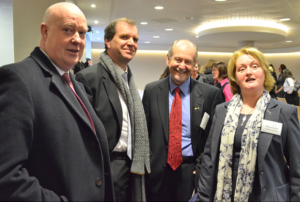
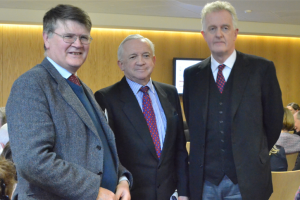
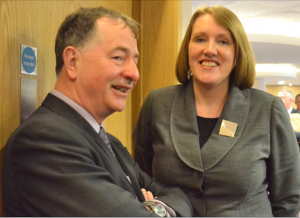
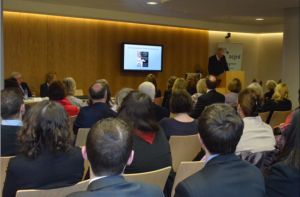
Photography by Eithne Ní Mhurchadha
Martin Tansey Memorial Lecture 2012 - Rehabilitation, Research and Reform: Prison Policy in Ireland
Dr Rogan is a Barrister and Lecturer in Socio-Legal Studies at Dublin Institute of Technology where she teaches law, criminology and prison policy, as well as facilitating a number of community-based learning projects. Mary is the Chairperson of the Irish Penal Reform Trust and author of Prison Policy in Ireland, Penal-Welfarism and Political Imprisonment
Martin Tansey Memorial Lecture 2011 - Where is our Criminal Justice System Going?
The 4th annual ACJRD Martin Tansey Memorial Lecture took place on Wednesday 11th May 2011 in the Criminal Courts of Justice, Dublin.
Dr. Shane Kilcommins of the Faculty of Law, at the University of Cork gave the lecture entitled: Where is our Criminal Justice System Going? This was well received by the audience which included staff members from many of the main Government agencies related to Criminal Justice and other members of the Criminal Justice community. The Probation Service of which Martin was a founding Director were well represented by several staff members including their Director Michael Donnellan.
Dr Kilcommins is a graduate of UL (BA 1994), University of Wales, Aberystwyth (Ph.D. 1999) and University College Cork (MA, 2007). He lectured in Aberystwyth and WIT before taking up his current position at UCC in 2001. He is an examiner in criminal law for the Law Society of Ireland, and an external examiner at UCD, DIT, and AIT. Dr Kilcommins is also deputy editor of the Judicial Studies Institute Journal and the Irish Law Quarterly and acts as a lay member on mental health tribunals. Shane is also currently serving on the ACJRD Council
Martin Tansey Memorial Lecture 2010 - Therapeutic Jurisprudence in Theory and Practice: International and Interdisciplinary Dimensions
Professor David B. Wexler gave the ACJRD 3rd Annual Martin Tansey Memorial Lecture on Wednesday 26th May at the Criminal Courts of Justice.
Wexler a Distinguished Professor at the Rogers College of Law, University of Arizona gave the lecture entitled "Therapeutic Jurisprudence in Theory and Practice: International and Interdisciplinary Dimensions”.
The lecture was enjoyed by a near capacity crowd following a tour of the impressive Courts building.
The Council and staff of the ACJRD would like to thank Professor Wexler for giving of his time to present the lecture. Thanks also to Kieran McGrath of the Irish Child & Family Institute who partnered ACJRD on the event, and all those who attended, contributing to the events success.
The association was particularly honoured by the attendance of members of Martin Tansey’s family as well as Sean Aylward, Secretary General, Department of Justice, Equality and Law Reform and presenter of the Inaugural Martin Tansey Memorial lecture in 2008.
These distinguished guests were joined by staff from many of the main Government agencies including the Probation Service where Martin Tansey was a founding director. Legal professionals and staff from local Universities, Hospitals and not-for-profit organisations were also in attendance. This diverse audience reflects the varied membership of the ACJRD and the wide reach of the Therapeutic Jurisprudence approach.
Professor Wexler is happy to be contacted in regards to TJ and to facilitate the joining of the TJ listserve. He can be contacted by email: This email address is being protected from spambots. You need JavaScript enabled to view it. .
For more information also see https://intltj.com/.

